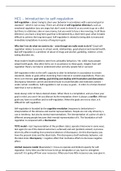HC1 – Introduction to self-regulation
Self-regulation = about trying to steer your behavior in accordance with a personal goal or
standard – which is not so easy. There are all kind of self-regulation dilemma’s, such as
emotional regulation (you are angry but don’t want to show it) or you want to go on a diet
but there is a delicious cake or save money, but you want to buy a nice new bag. In all these
dilemma’s you have a long-term goal that is threatened by a short-term goal, what it makes
difficult to achieve the long-term goal. Self-regulation is related to being able to transcend
immediate temptations in service of long-term goal.
Why don’t we do what we want to do – even though we really want to do it? Good self-
regulation relates to success in school, work, relationships, good physical and mental health.
Bad self-regulation is a predictor of abuse of drugs and alcohol, gambling, violence, crime,
eating disorders etc.
Most modern health problems stem from unhealthy behaviors. Yet, while many people
adopt health goals, they often fail to act in accordance to these goals. Insights from self-
regulation theory can help to understand when and why people fail or succeed.
Self-regulation refers to the self’s capacity to alter its behaviors in accordance to certain
standards, ideals or goals either stemming from internal or societal expectations. There are
three core themes: goal setting, goal driving and dealing with frustration and distraction.
Discrepancy between current and desired state is uncomfortable and motivates actions –
under certain conditions. Self-regulation is not so easy as goals – it refers to a future desired
state that is not so obvious.
Goals always refer to future desired states. When there is a temptation, and you have your
goal in mind, you won’t let you distract by the temptation, there is always a conflict. Without
goals you have no conflicts and no self-regulation. When the goals are not so clear, is it
difficult for self-regulation.
Self-regulation is founded by the cognitive revolution (response to behaviorism) =
interpretation of the stimulus and mental representations. People are not only driven by a
cue or tendency, but also by mental representations. The interpretation of a piece of cake is
different among people because their mental representation of it. The foundation of self-
regulation is compared with a thermostat.
TOTE model = test (representation of the problem state), operate (intervene in some way),
test again (to see if the desired outcome is achieved) and exit (problem solved). A process
driven by affect resulting from presence/absence of discrepancy. On this discrepancy you
have the present state and the ideal state. This discrepancy itself motivates behavior, not
the ideal state. Discrepancy = negative affect that motivates efforts to decrease negative
affect.
Limited resource model (Baumeister) = focus on operate and limited capacity for self-
regulation. Every time you like to have to let go temptation or you have to strengthen
yourself, it is going off from your resources. When you have little resources you easy give in.
, Regulatory focus model (Higgins) = promotion versus prevention self-regulation. If you really
want something, then it is more prone to self-regulation success.
Behavioral enactment model (Gollwitzer) = focus on motivation and volition as two crucial
self-regulation stages.
Self-determination theory = two types of self-regulation: autonomous self-regulation
(behavior is regulated by reasons that a person values) and controlled self-regulation
(regulations by internal/external pressure). Controlled self-regulation depletes energy. Self-
regulation of behavior that you really want to, is less depletive.
Needs motivate behavior (action toward a goal) and are critical for survival (biological,
psychological and socialized needs). Example of hunger – there are many reasons why we
eat, biological and psychological needs are not the same. Needs are inborn necessities rather
than acquired motives. According to the self-determination theory there are three types of
needs: autonomy (psychological need to experience self-direction and personal
endorsement in the initiation and regulation of one’s behavior – you want to have and make
your own choice, control about your life), competence (a psychological need to be effective
in interactions with the environment), relatedness (a psychological need to establish close
emotional bonds and attachments with other people). Hiearchy of needs (Maslow –
humanistic/positive psychology) = at the bottom the needs driven by surviving (deficiency
motivation) and at the top self-actualization (grow motivation). You don’t need to fulfill all
the basic needs to reach the top.
Needs motivate behavior to fulfill those needs. Even when motivation is high, you still need
self-regulation tools to translate motivation into action. Motivation = energy to act in a
certain direction. Determinants are desirability = expected value of a desired future and
feasibility = expectations of attaining this desired future. Expectations are really important.
Expectations = beliefs or judgements of the likelihoods of future events that are based on
past performance and experience. You have different expectations, like self-efficacy
expectations, outcome expectations and general expectations. SR is needed beyond
feasibility and desirability; it helps people to deal with obstacles standing in the way of
attaining desired outcomes. In contrast to motivational strategies, SR strategies don’t aim at
enhancing perceived desirability or feasibility, but as assuring that they become behaviorally
relevant.
‘7 deadly threats to self-regulation’
1. Cue exposure = if you see a nice temptation that is in contrast to your long-term goal
you are exposed to the cue, and impulse control
2. Emotional distress and social distress. People are more focus on regulation their
emotions that goes at the expense of overcome the temptation.
3. Lapse-activated patterns and abstinence violations. When you ones give in, you give
up your full long-term goal, because you think everything is spilled.
4. Impairments of self-monitoring and self-awareness.
5. Influence of other people.
6. Self-regulatory resource depletion.
7. Alcohol intoxication: large cause of relapse.






